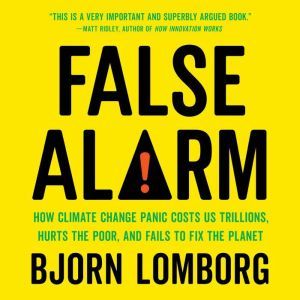

7 Rating(s)
List: $27.99
| Sale: $19.59
Club: $13.99
False Alarm
How Climate Change Panic Costs Us Trillions, Hurts the Poor, and Fails to Fix the Planet
Author: Bjorn Lomborg
Narrator: Jim Seybert
Unabridged: 9 hr 2 min
Format: Digital Audiobook Download
Publisher: Basic Books
Published: 07/14/2020
Categories: Nonfiction, Science, Global Warming & Climate Change
Includes:
Bonus Material
![]()
Synopsis
An “essential” (Times UK) and “meticulously researched” (Forbes) book by “the skeptical environmentalist” argues that panic over climate change is causing more harm than good
Hurricanes batter our coasts. Wildfires rage across the American West. Glaciers collapse in the Arctic. Politicians, activists, and the media espouse a common message: climate change is destroying the planet, and we must take drastic action immediately to stop it. Children panic about their future, and adults wonder if it is even ethical to bring new life into the world.
Enough, argues bestselling author Bjorn Lomborg. Climate change is real, but it’s not the apocalyptic threat that we’ve been told it is. Projections of Earth’s imminent demise are based on bad science and even worse economics. In panic, world leaders have committed to wildly expensive but largely ineffective policies that hamper growth and crowd out more pressing investments in human capital, from immunization to education. In a new epilogue, Lomborg brings the story up to date, showing the ineffective and costly environmental policies of the Biden administration.
False Alarm will convince you that everything you think about climate change is wrong. It points the way toward making the world a vastly better, if slightly warmer, place for us all.
Hurricanes batter our coasts. Wildfires rage across the American West. Glaciers collapse in the Arctic. Politicians, activists, and the media espouse a common message: climate change is destroying the planet, and we must take drastic action immediately to stop it. Children panic about their future, and adults wonder if it is even ethical to bring new life into the world.
Enough, argues bestselling author Bjorn Lomborg. Climate change is real, but it’s not the apocalyptic threat that we’ve been told it is. Projections of Earth’s imminent demise are based on bad science and even worse economics. In panic, world leaders have committed to wildly expensive but largely ineffective policies that hamper growth and crowd out more pressing investments in human capital, from immunization to education. In a new epilogue, Lomborg brings the story up to date, showing the ineffective and costly environmental policies of the Biden administration.
False Alarm will convince you that everything you think about climate change is wrong. It points the way toward making the world a vastly better, if slightly warmer, place for us all.